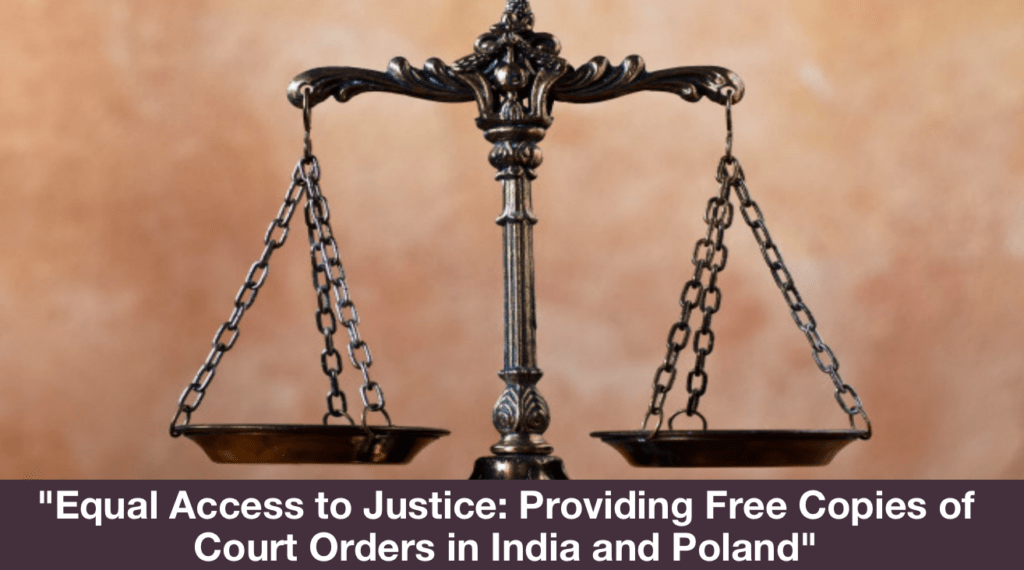
This Article is written by Szymon Gorny, Maastricht University, semester 4, Intern under Legal Vidhiya
Abstract:
Access to justice, a cornerstone of any democratic society, underscores the principle that every individual, regardless of their background or financial means, should have the opportunity to engage with the legal system. A pivotal aspect of this access is the availability of court orders and judgments. India and Poland, two nations with diverse histories, legal systems, and democratic journeys, have undertaken significant strides to ensure that copies of court orders are provided free of cost. This shift represents a profound commitment to fostering transparency, accountability, and equal access to justice for all.
In India, the constitutional mandate for equal access to justice is deeply embedded, with the preamble envisioning justice as a universal right transcending socio-economic divides. The recent policy reform to provide free copies of court orders signifies an important step toward realizing this constitutional vision. This transformation enhances transparency in India’s legal landscape, enabling the public, legal professionals, and researchers to scrutinize and comprehend the reasoning behind court judgments. Legal practitioners and scholars benefit immensely, conducting research and analysis without financial constraints. Moreover, individuals involved in legal proceedings gain insights into court decisions, empowering them to make informed decisions about further legal action.
In Poland, the journey towards equal access to justice reflects the nation’s transition from authoritarianism to democracy. Recent developments underscore the importance of making court orders accessible to all citizens. This initiative strengthens transparency within the legal system, bolstering trust in the justice system’s integrity. Legal professionals, scholars, and parties to legal disputes are empowered through free access to court orders, fostering active participation in the pursuit of justice.
A comparative analysis reveals both commonalities and differences in the approaches of India and Poland. While their legal, cultural, and historical contexts differ, both nations share a commitment to democratic values and justice principles. Providing free copies of court orders represents a transformative step towards building more just, inclusive, and accountable legal systems. India and Poland, as global beacons of change, contribute to the discourse on equal access to justice, transparency, and trust in democratic societies.
Introduction:
Access to justice is a cornerstone of any democratic society, embodying the principle that every individual, irrespective of their background or financial means, should have the opportunity to engage with the legal system. An essential facet of this access is the availability of court orders and judgments. Recognizing the significance of this aspect of justice, both India and Poland, two nations with diverse histories and legal systems, have initiated transformative steps to ensure that copies of court orders are provided free of cost, marking a profound shift towards fostering transparency, accountability, and equal access to justice for all.
In both nations, this commitment to equal access to justice underscores the values of fairness, equity, and the rule of law that are at the heart of their democratic frameworks. As they embrace this commitment, India and Poland find themselves at the forefront of a global movement aimed at democratizing access to legal information and bolstering public trust in their respective justice systems.
This comparative analysis delves into the evolving legal landscapes of India and Poland, with a particular focus on the provision of free copies of court orders—an initiative that is poised to redefine the dynamics of their justice systems. By examining the motivations, implications, and challenges surrounding this policy shift, this in-depth exploration seeks to shed light on the broader implications of equal access to justice in these diverse societies.
In the subsequent sections, we will delve into the distinctive journeys of India and Poland, considering their unique legal and cultural contexts, to unveil the significance of providing free copies of court orders. We will then engage in a comparative examination of these two nations, highlighting the commonalities and differences in their approaches, and discuss the transformative impact of these policies on the pursuit of justice, transparency, and accountability. Finally, we will conclude by underlining the shared commitment of India and Poland to the democratic ideals of equal access to justice and the role they play as beacons of change on the global stage.
Equal Access to Justice in India:
In India, the concept of providing equal access to justice is deeplying rained in the nation’s constitutional ethos. The Indian Constitution, in its preamble, sets forth the aspiration of securing justice for all citizens, transcending disparities of wealth, status, or influence. The recent policy shift in India to provide free copies of court orders signifies a substantial stride toward realizing this constitutional vision.
Transparency and Trust in India’s Legal Landscape:
Central to India’s commitment to equal access to justice is the enhancement of transparency within its legal system. The release of court orders at no cost signifies an unprecedented opening of legal proceedings to the public, legal practitioners, scholars, and researchers alike. This newfound accessibility carries profound implications as it enables a broader segment of society to scrutinize and understand the reasoning behind court judgments, thereby fostering trust in the justice system’s impartiality.
This policy change yields multifaceted benefits, with legal professionals and researchers emerging as primary beneficiaries. Legal practitioners can now access court orders without financial constraints, which is essential for conducting comprehensive legal research, preparing legal arguments, and contributing to the development of legal precedents. Scholars, too, find themselves better equipped to delve deeper into the intricacies of legal decisions, thus enriching the academic landscape of Indian jurisprudence.
Moreover, individuals directly involved in legal proceedings stand to gain immensely from this policy shift. They now have the opportunity to review their cases more comprehensively, gaining insights into the rationale behind court judgments. Armed with this knowledge, they can make more informed decisions about pursuing further legal action, filing appeals, or seeking redress. This not only empowers individuals but also augments the quality and fairness of legal proceedings, reinforcing the principle of equal justice for all.
Poland’s Commitment to Equal Justice:
Poland’s journey towards ensuring equal access to justice reflects the nation’s transformative shift from authoritarianism to democracy. Recent developments within its legal landscape place a significant emphasis on making court orders readily accessible to all citizens.
Strengthening Transparency and Accountability:
In Poland, the provision of court orders at no cost plays a pivotal role in strengthening transparency and accountability within the legal system. This initiative empowers the public, including individuals, organizations, and legal practitioners, to scrutinize judicial decisions, thereby fostering trust in the integrity of the justice system. The release of court orders ensures that Poland’s legal landscape becomes more open, transparent, and responsive to the needs of its diverse society.
Legal professionals and scholars are equally poised to gain substantially from this policy shift. The availability of court orders free of cost provides them with vital resources for precedent analysis, academic research, and the practice of law. It ensures that legal practitioners have the necessary tools and materials to advocate effectively for their clients, contribute to the development of legal discourse, and enrich Poland’s legal landscape.
Additionally, parties involved in legal disputes are better equipped to comprehend the basis of court decisions, promoting informed decision-making and potentially reducing the burden on the judicial system. This access to information empowers individuals to engage more actively in the pursuit of justice, fostering a sense of ownership and participation in the legal process.
A Comparative Analysis:
While both India and Poland have embarked on separate journeys towards equal access to justice through the provision of free copies of court orders, a comparative analysis reveals intriguing commonalities and differences in their approaches. Both nations share a deep-seated commitment to democratic values and the principles of justice. However, their unique legal, cultural, and historical contexts have shaped the implementation and impact of these policies in distinctive ways.
India’s vast and diverse legal landscape, coupled with its unwavering commitment to ensuring justice for all, emphasizes the profound significance of transparency in its legal proceedings. The release of court orders at no cost aligns seamlessly with India’s democratic ethos and its commitment to ensuring that justice is not merely dispensed but also seen to be done.
Conversely, Poland’s journey toward equal access to justice is characterized by its transformation from authoritarianism to democracy. In this context, making court orders accessible to all citizens is an essential step in fostering transparency, accountability, and trust within its legal system.
However, what unites these two nations is the recognition that providing free copies of court orders is a transformative step toward building a more just, inclusive, and accountable legal system. These policies serve as tangible embodiments of their shared commitment to the principles of fairness and equality that underpin their respective democracies.
Conclusion:
In conclusion, the provision of free copies of court orders in India and Poland represents a significant milestone in their quests for equal access to justice. These policies enhance transparency, empower legal professionals and scholars, and enable individuals involved in legal proceedings to navigate the legal landscape more effectively. India and Poland, each with its unique legal, cultural, and historical context, share a common commitment to democratic values and the principles of justice.
As they continue to evolve and engage with global norms, these policies represent essential steps toward building more just, inclusive, and accountable legal systems that serve the needs of all citizens, irrespective of their background or socioeconomic status. In the pursuit of equal access to justice, India and Poland serve as beacons of change on the global stage, reinforcing the vital importance of transparency, accountability, and equal justice within democratic societies. Their policies not only resonate domestically but also contribute to the global discourse on democratizing access to legal information and fostering trust in justice systems.




0 Comments